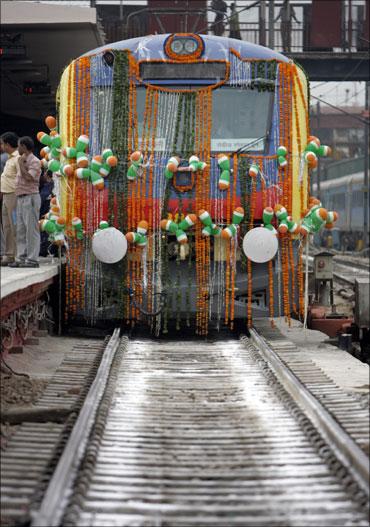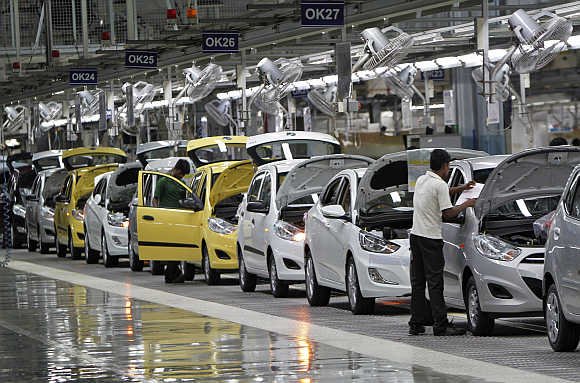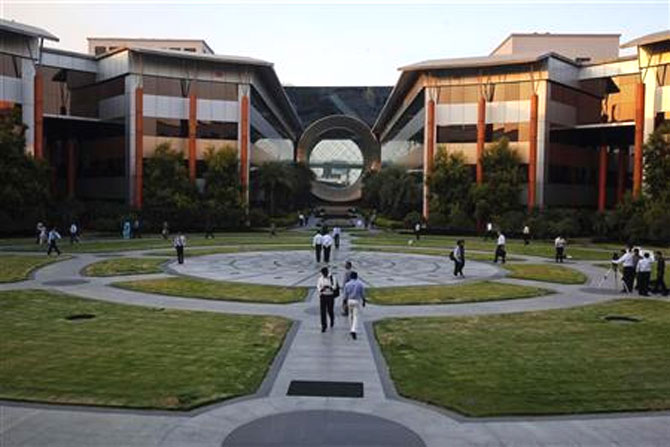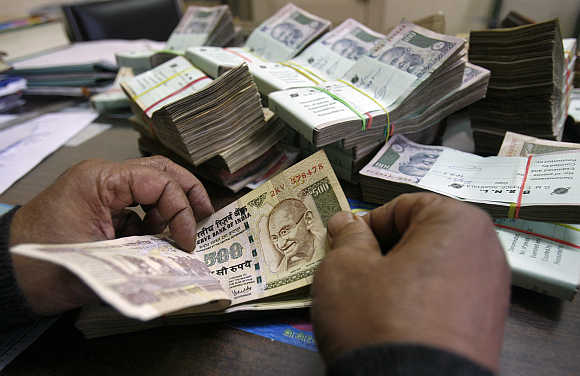 | « Back to article | Print this article |
Doing business in India set to become easier
Rajiv Jain, a Jaipur-based 29-year-old entrepreneur, sees the government's nascent eBiz project as a game-changer. "Frankly, I never knew something like this existed," he says.
Conceptualised and developed by the Department of Industrial Policy and Promotion (DIPP) in collaboration with Infosys, the eBiz project is aimed at making the clearance and compliance processes smooth for entrepreneurs.
Jain, in the business of making shoes, has been using certain services of the portal since it was launched by Commerce & Industry Minister Anand Sharma last year.
"The idea is to improve the country's investment scenario. Besides, this will also help improve India's ranking in the World Bank 'Ease of Doing Business' report," DIPP Joint Secretary Talleen Kumar, who has been instrumental in building the project, tells Business Standard.
Click NEXT to read more…
Doing business in India set to become easier
It will provide a single-stop shop for all business licences and permits, eliminate the need for a physical interface with various regulatory authorities at the central, state and local government levels and provide all business-related information 24x7 on a single portal.
"The trick here is to get more state government clearances online, as opposed to the central government clearances, in a time-bound manner. Investors are increasingly using the eBiz portal. But there is scope of improvement and I am sure a paradigm shift is going to happen as the project gets launched gradually," highlights Didar Singh, secretary-general of Federation of Indian Chambers of Commerce and Industry, which jointly runs the 'Invest India' initiative with DIPP.
The second phase of the project, which will bring into its ambit more states, such as Odisha, Punjab, Rajasthan, Uttar Pradesh and West Bengal, is going to be launched on Monday. The project was launched in Tamil Nadu, Andhra Pradesh, Maharashtra, Haryana and Delhi in its first phase.
Click NEXT to read more…
Doing business in India set to become easier
Five more services, including registration of taxes and fire department clearances, are being added during this phase. It is envisaged that a little more than 200 services related to investors and businesses will be rolled out across the country over the next 10 years.
The total cost of the project - for 26 central and 24 state government services and clearances in each of the ten pilot states - has been Rs 86.77 crore.
According to Raghupathi C N, head (India business), Infosys Technologies, it typically takes 200 days for a business to be set up in India. In comparison, it takes between two and three weeks in countries like Singapore.
"So, this project is aimed at increasing India's competitiveness in the commercial and industrial space. So far, only 50-60 per cent of the services were digital; the rest were manual. We expect the project to roll out faster over the next six months to one year," he says.
As part of the project agreement, Infosys will also undertake training, workshops, promotion and awareness campaigns with business chambers.
Click NEXT to read more…
Doing business in India set to become easier
However, the project is also facing stiff opposition from certain quarters of the government, such as the Central Board of Excise and Customs and the Central Board of Direct Taxes and the environment & forests ministry.
This has resulted in delay of the second phase, which was supposed to have been launched in August last year.
Raghupathi believes implementing the project is going to be difficult for those government agencies that have not digitised their services.
He adds Infosys will charge users on a per-service model when more are added to the portal. Once the services are fully operationalised, users will have to pay DIPP for every service through the portal; part of the fees will be passed on to Infosys.
Click NEXT to read more…
Doing business in India set to become easier
A recent World Bank study ranked India 134th among 189 countries in terms of ease of doing business.
A committee has been set up under Planning Commission member Arun Maira to improve the country's business environment by streaming the regulatory and licensing requirements.
TRICKS OF THE TRADE
Key conditions countries need to fulfil to obtain a better ranking in World Bank's 'Ease of Doing Business' index:
- Making it easy to start a business
- Making it easy to deal with construction permits
- Making it easy to get electricity connection
- Making it easy to register property
- Making it easy to get credit
- Making it easy to pay taxes
- Making it easy to trade across borders
- Making it easy to enforce contracts during a problem
- Making it easy to resolve solvency
- Protecting investors





